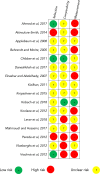Is female genital mutilation/cutting associated with adverse mental health consequences? A systematic review of the evidence
- PMID: 31406589
- PMCID: PMC6666816
- DOI: 10.1136/bmjgh-2019-001553
Is female genital mutilation/cutting associated with adverse mental health consequences? A systematic review of the evidence
Abstract
Introduction: The adverse physical consequences of female genital mutilation/cutting (FGM/C) have been thoroughly investigated and documented. Yet, we know little about the adverse mental health consequences of the practice. To fill this research gap, we systematically reviewed studies that assessed any adverse mental health consequences related to FGM/C.
Methods: We searched four databases from inception to 21 December 2018. We then reviewed all titles and abstracts for relevant studies. We used the National Institutes of Health quality assessment tool to appraise the quality of each study and the Newcastle-Ottawa Scale to rate the risk of bias within studies.
Results: We included 16 studies in this review; only six studies examined the association between FGM/C and adverse mental health outcomes as the sole research question. Among the included studies, 10 were conducted at the participants' country of origin. The sample size of the populations studied ranged from 3 to 4800 participants. Only one study received a rating of 'good' methodological quality.Fourteen of the 16 studies reported an association between FGM/C and at least adverse mental health outcome. These included eight studies that reported a higher burden of adverse mental health outcomes among women who underwent FGM compared with women who did not undergo FGM/C. Four studies reported a correlation between the severity of FGM/C and the severity of adverse mental health outcomes.
Conclusion: This systematic review documents an association between FGM/C and adverse mental health outcomes. Importantly, our review demonstrates the need for more rigorous research on the topic.
Keywords: FGM/C; PTSD; anxiety; depression; female genital mutilation/cutting; mental health.
Conflict of interest statement
Competing interests: None declared.
Figures



References
-
- UNICEF Female genital mutilation, 2018. Available: https://data.unicef.org/topic/child-protection/female-genital-mutilation/ [Accessed 26 Feb 2019].
-
- WHO Female genital mutilation, 2018. Available: https://www.who.int/news-room/fact-sheets/detail/female-genital-mutilation [Accessed 26 Feb 2019].
-
- WHO Eliminating female genital mutilation: An interagency statement - OHCHR, UNAIDS, UNDP, UNECA, UNESCO, UNFPA, UNHCR, UNICEF, UNIFEM, WHO. WHO. Geneva 2018.
Publication types
LinkOut - more resources
Full Text Sources
Medical
Miscellaneous
